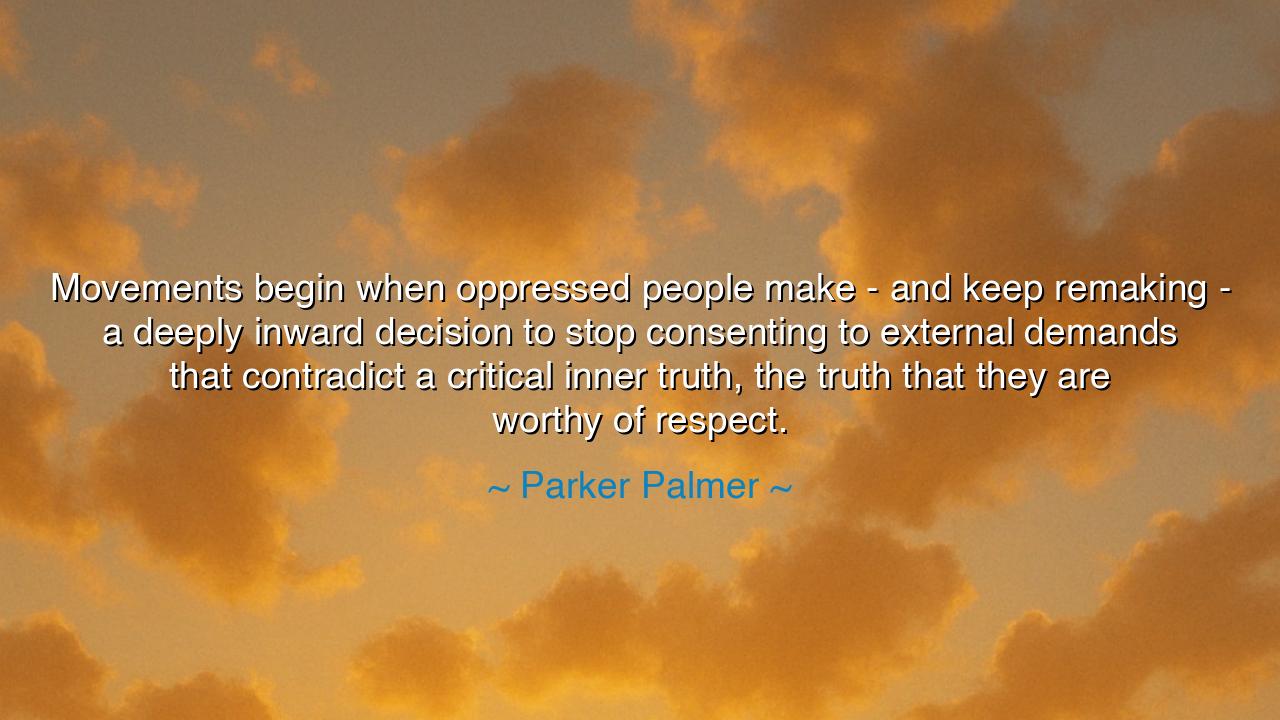
Movements begin when oppressed people make - and keep remaking -
Movements begin when oppressed people make - and keep remaking - a deeply inward decision to stop consenting to external demands that contradict a critical inner truth, the truth that they are worthy of respect.






Hearken to the words of Parker Palmer, whose reflection illuminates the sacred spark of resistance and the birth of movements. He declares, “Movements begin when oppressed people make—and keep remaking—a deeply inward decision to stop consenting to external demands that contradict a critical inner truth, the truth that they are worthy of respect.” In these words lies an eternal principle: the roots of social change are not found only in speeches, marches, or laws, but in the resolute affirmation of one’s own dignity and worth, a truth that no external power can erase.
Since antiquity, philosophers and sages have recognized the power of inward resolve as the seed of transformative action. Socrates, condemned for his pursuit of truth, exemplified a life guided by an inner moral compass, refusing to betray conscience despite external pressures. Palmer’s words echo this ancient wisdom: when individuals recognize their inherent dignity and act in alignment with it, even the weight of oppression cannot subdue the flame of justice. Movements, like rivers, begin as small currents within the heart, gradually gathering strength to reshape the landscape of society.
Consider the life of Rosa Parks, whose quiet yet monumental refusal to surrender her seat on a Montgomery bus sparked the American civil rights movement. Her act was not impulsive, but the manifestation of a deeply inward decision: to refuse consent to injustice and to affirm her worth and dignity. Parks’ courage illustrates Palmer’s principle: the genesis of a movement is rooted in the repeated affirmation of a critical inner truth, a refusal to internalize oppression as reality.
Palmer emphasizes that this inward decision must be remade continually. Oppression is persistent, subtle, and adaptive; it seeks to undermine the self-worth of those it subjugates. Ancient sages, from Confucius to the Stoics, taught the discipline of continual self-examination and reaffirmation of virtue. Similarly, movements do not flourish through a single act of defiance, but through sustained commitment to the inner truth that all people are worthy of respect, and that injustice cannot dictate the moral compass of the oppressed.
The reflection also illuminates the ethical core of social action. Movements rooted in an inner affirmation of dignity are inherently nonviolent and principled, for they arise from self-respect and moral clarity, not from desire for vengeance. Gandhi’s campaign of nonviolent resistance against British colonial rule exemplifies this truth: his movement gained momentum not merely through protests, but because millions affirmed their worth and refused to consent to injustice, guided by the inner compass of truth and dignity.
The moral lesson is clear: before seeking to transform the world, one must first cultivate an unwavering recognition of one’s own worth. External change flows from internal resolution. Palmer teaches that liberation is born not only from dismantling oppressive structures, but from sustained inner affirmation of dignity, the courage to reject demands that contradict the truth of human worth.
Practical guidance emerges naturally: practice daily self-reflection, affirm your own dignity, and refuse silently or openly to consent to injustice. Encourage others to recognize their worth, fostering solidarity built on respect rather than fear. Movements begin not with rhetoric alone, but with the inward courage to honor human dignity, repeatedly and unflinchingly.
Thus, heed the wisdom of Parker Palmer: every enduring movement begins in the heart, where oppressed souls make and remake the decision to refuse submission to injustice, affirming the truth that they are worthy of respect. Let this inner fire guide action, inspire courage, and sustain the long struggle for justice. In nurturing this resolve within ourselves, we plant the seeds of liberation and righteousness that will grow to illuminate the world for generations yet to come.






AAdministratorAdministrator
Welcome, honored guests. Please leave a comment, we will respond soon